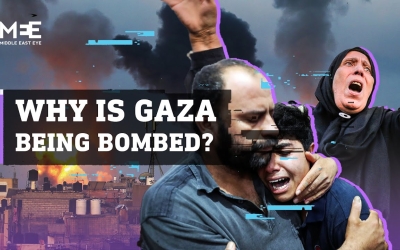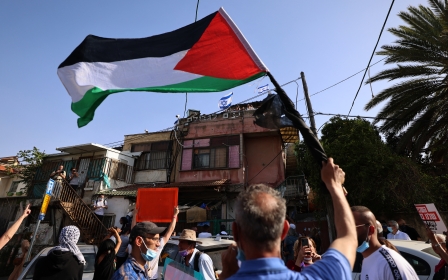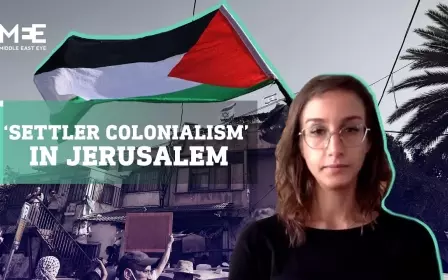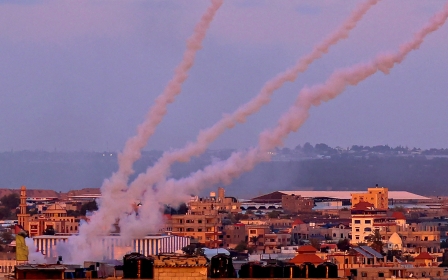Jerusalem: Israeli court postpones decision on Silwan evictions amid crackdown on protest
Israeli police cracked down on a demonstration against the forced displacement of Palestinian families from the Batn al-Hawa neighbourhood of Silwan, East Jerusalem, early on Wednesday, as the Jerusalem District Court heard an appeal in their eviction cases.
Seven Palestinian families from the neighbourhood were ordered to leave their homes in 2020. Two of them, the Najah and the Kayed al-Rajabi families, submitted their appeal to the Jerusalem court early on Wednesday.
The court heard the appeal and decided to postpone its final verdict.
Outside, residents of Silwan, a small town south of Jerusalem’s Old City, gathered alongside dozens of supporters to denounce the eviction orders.
Israeli security forces violently quelled the rally, beating demonstrators and arresting 16-year-old Sultan Surhan.
Qutaiba Odeh, a resident of Silwan whose house is threatened with a demolition order, said that what was happening in Sheikh Jarrah was now happening in Silwan.
“The Israeli settler groups behind the eviction cases in Sheikh Jarrah are the same ones coming after these houses in Silwan,” Odeh told Middle East Eye.
“It’s the same shared struggle, against the same occupation,” Odeh added. “We said save Sheikh Jarrah yesterday, we say save Silwan today.”
Backdrop of violence
The Wednesday court hearing came against a backdrop of weeks of violence and killings across the occupied Palestinian territories.
North of Jerusalem’s Old City, 40 families from Sheikh Jarrah are battling similar eviction orders in Israeli courts, a case that has garnered international support.
Israeli forces aggressively clamped down on solidarity protests in Sheikh Jarrah earlier this month, then raided al-Aqsa Mosque. In retaliation, Hamas fired rockets into Israel, and Israel pummeled Gaza with bombs.
At least 248 Palestinians were killed by the Israeli bombardment of Gaza, while 29 were killed in the occupied West Bank and East Jerusalem by Israeli forces. Another two Palestinian citizens of Israel were killed by Israeli fire in the same period.
In Israel, rockets fired from Gaza killed at least 12 people.
Jerusalem eviction cases
Palestinian residents of Silwan and the adjacent neighbourhoods of al-Bustan and Wadi al-Hilweh in East Jerusalem have faced the threat of expulsion from their homes for years.
The Ateret Cohanim settler group, one of many groups working to evict Palestinians from their homes in Jerusalem with support from the Israeli government, has sued residents of Batn al-Hawa, claiming part of their lands belonged to Yemeni Jews before 1948.
The number of standing eviction orders issued by Israeli courts against Palestinian families in the area has so far reached 87, which threatens to leave some 700 Palestinians forced out of their homes to make way for Israeli settlers, according to Israeli NGO Ir Amim.
Israeli law works in favour of settlers by allowing only Jews to claim property they owned before 1948, while denying the same right to Palestinians. In Silwan, some of the families have been in their homes for up to 60 years.
Currently, 400 Israeli settlers live in roughly 12 areas - protected by the Israeli army and military police - among the 55,000 or so Palestinians of Silwan, al-Bustan, Batn al-Hawa and Wadi al-Hilweh.
The London-based human rights group Amnesty International has called on Israel to scrap the planned evictions, denouncing it as another “illustration of Israel’s criminal policy of forced displacement”.
Israel occupied the West Bank, including East Jerusalem, in 1967, and unilaterally annexed the latter and applied its civil law on its population, in violation of international law.
Middle East Eye delivers independent and unrivalled coverage and analysis of the Middle East, North Africa and beyond. To learn more about republishing this content and the associated fees, please fill out this form. More about MEE can be found here.





